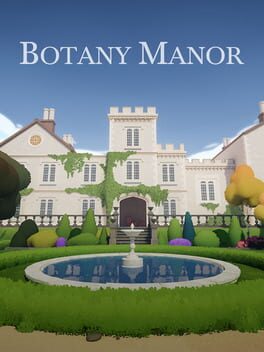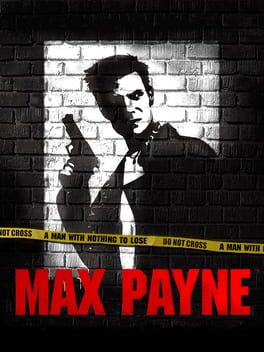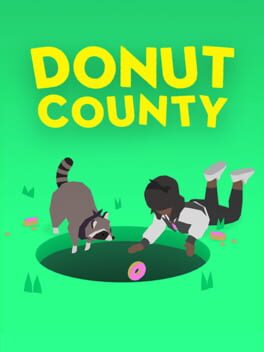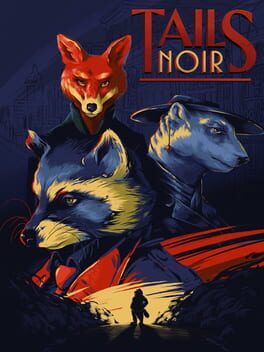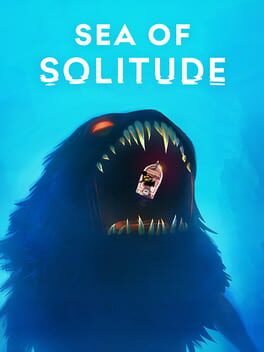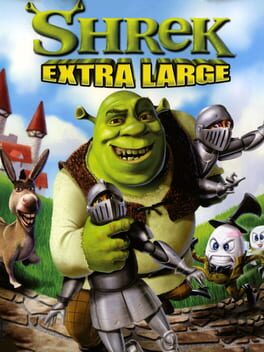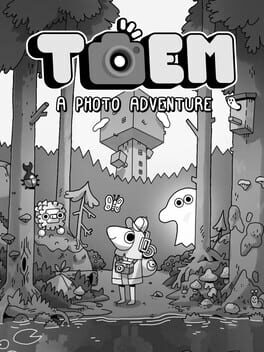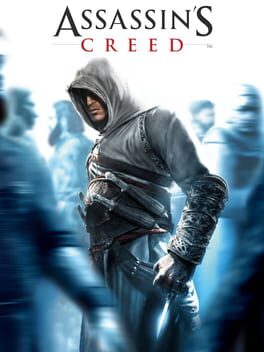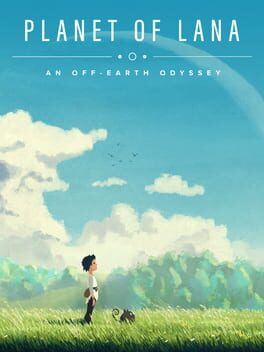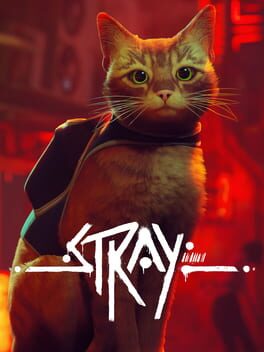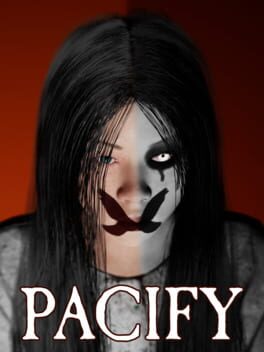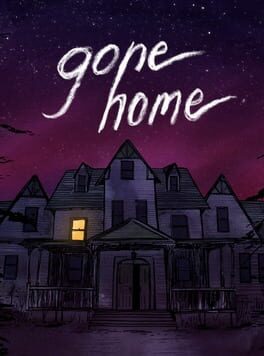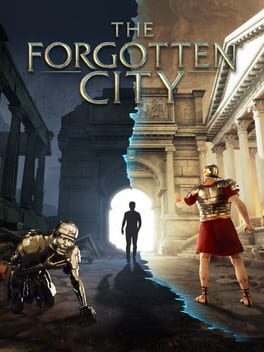UnikOffical
2021
Great and comprehensive adventure. I love the story that cleverly connects the stories of all the characters together (and this is one of the few games where you really feel that your choices are important, although they themselves are not too branched). And in general, this narrative structure is quite fresh and appropriate. The characters are just great, and it's great to see them develop and interact more and more towards the end of the game (special thanks to the creepy guy in the hat, his episodes are so tense that you feel like you're in different game). Intersections of the consequences of different playable heroes are also satisfying, and in general the gameplay maintains the level of diversity in the choice that is laid down by the narrative (also a lot of fun minigames here and there).
Of course, the general setting of forces seems a little simple and sometimes you can catch a cringe from the dialogues of some characters, but in general this is a very worthy story that you really want to go through again and see the consequences of other choices. And since the story dominates everything here, the game itself also leaves behind a positive impression (almost) without negative points. I will definitely return to Road 96 again one day, and for a game built around replay value, this is really a merit.
Of course, the general setting of forces seems a little simple and sometimes you can catch a cringe from the dialogues of some characters, but in general this is a very worthy story that you really want to go through again and see the consequences of other choices. And since the story dominates everything here, the game itself also leaves behind a positive impression (almost) without negative points. I will definitely return to Road 96 again one day, and for a game built around replay value, this is really a merit.
2024
A simple and enjoyable puzzle game about growing fantastic plants in the ambiance of a beautiful late 19th century estate. I really like that the game is quickly engaging and perfectly maintains the balance of difficulty, never becoming annoying and always remaining quite interesting in finding solutions to problems. The process of collecting information from various sources (which also tell a good story about the world and the heroine's life) and putting the pieces together into a single way of growing plants is very satisfying, and each plant and the way it is grown feels quite unique. The gradual exploration of the (it should be noted quite beautiful) location is also attractive, although the game does not go too deep into its disclosure. Only the expected social message can lead to a little sadness in this relaxing walk, but on the other hand, it’s good that it is there and that it deepens the story.
A good source of a fairly pleasant and relaxing couple of evenings that doesn't aim to be the next big thing in the genre, but it doesn't need to be. It's enough to be what it is - a good opening entry and just a good game. And after finishing it, I had a strong desire to see more stories about the quiet life in the 19th century, with a focus on the simple life of the people and about social or scientific development; perhaps this is actually a much more interesting direction than another game about space and science fiction.
A good source of a fairly pleasant and relaxing couple of evenings that doesn't aim to be the next big thing in the genre, but it doesn't need to be. It's enough to be what it is - a good opening entry and just a good game. And after finishing it, I had a strong desire to see more stories about the quiet life in the 19th century, with a focus on the simple life of the people and about social or scientific development; perhaps this is actually a much more interesting direction than another game about space and science fiction.
2001
There are so many iconic phrases and lines in the game that it would be possible to create a review that would include only them.
But really, a lot can be said (because this is an outstanding game), but it’s hard for me to put my impressions together, so I’ll just focus on three things:
1) I really like that I completed this game after Alan Wake, because it was interesting to see similar plot and stylistic decisions that create a single style of Remedy through the years and projects, and initially I did not expect that already in 2001 they consciously strove into this area.
2) Even now this is a very lasting example for modern projects in our industry. And in terms of cinematography, both Remedy themselves and the other developers have made good progress, but the high-quality level of interactivity still surprises and shames some modern projects. I really like that the player can interact with everything, and often you will hear different corresponding sounds from devices and other surroundings, cabinets open and you can find some more equipment, and at times you need to find some kind of button or panel in order to advance further. It sounds rather primitive, but the overall pleasant level of interactivity makes it sad to think that modern large projects of a similar genre do not seem to develop the idea of interactivity at all. And it’s an extreme pity, because this is such an interesting tool for deepening level design and gameplay in general! And Max Payne demonstrates this perfectly (especially in the second half of the game) - there really is an episode with a minecart, a sniper episode with a high moving platform, parkour over lava and an episode where you need to shoot mines in an elevator shaft while the elevator itself is moving towards them (!!!). Well, the ending is also a great example of this.
3) Well, the story and its presentation through comics are excellent. As is the gameplay. Just like the visual. So is the music. Just like Max himself. As you can see from this and previous paragraphs, I really liked the game. Definitely deserving of its cult status, Max Payne is one of the most prominent representatives of his era. Like cold night New York, it is undoubtedly not ideal, but still so charming.
(And do we really need a remake that loses the polygonal charm of the original?)
But really, a lot can be said (because this is an outstanding game), but it’s hard for me to put my impressions together, so I’ll just focus on three things:
1) I really like that I completed this game after Alan Wake, because it was interesting to see similar plot and stylistic decisions that create a single style of Remedy through the years and projects, and initially I did not expect that already in 2001 they consciously strove into this area.
2) Even now this is a very lasting example for modern projects in our industry. And in terms of cinematography, both Remedy themselves and the other developers have made good progress, but the high-quality level of interactivity still surprises and shames some modern projects. I really like that the player can interact with everything, and often you will hear different corresponding sounds from devices and other surroundings, cabinets open and you can find some more equipment, and at times you need to find some kind of button or panel in order to advance further. It sounds rather primitive, but the overall pleasant level of interactivity makes it sad to think that modern large projects of a similar genre do not seem to develop the idea of interactivity at all. And it’s an extreme pity, because this is such an interesting tool for deepening level design and gameplay in general! And Max Payne demonstrates this perfectly (especially in the second half of the game) - there really is an episode with a minecart, a sniper episode with a high moving platform, parkour over lava and an episode where you need to shoot mines in an elevator shaft while the elevator itself is moving towards them (!!!). Well, the ending is also a great example of this.
3) Well, the story and its presentation through comics are excellent. As is the gameplay. Just like the visual. So is the music. Just like Max himself. As you can see from this and previous paragraphs, I really liked the game. Definitely deserving of its cult status, Max Payne is one of the most prominent representatives of his era. Like cold night New York, it is undoubtedly not ideal, but still so charming.
(And do we really need a remake that loses the polygonal charm of the original?)
2018
A fun little game about the mischief of a raccoon and the swallowing of the whole city by a donut hole. It is very stylish, sweet and with an unusual and pleasant soundtrack. The plot is quite simple and the diverse characters complement it well. It's nice that as the game progresses, the possibilities for interacting with the world expand, and in the end the elements of all levels are combined.
In general, it's hard to say anything more about Donut County. It's a pleasant couple of hours in a beautiful world that will make your evening warmer and a little better. And why not agree to it?
In general, it's hard to say anything more about Donut County. It's a pleasant couple of hours in a beautiful world that will make your evening warmer and a little better. And why not agree to it?
2021
Quite an enjoyable adventure with great style and visuals, an intriguing world and a good prologue. I have questions about everything that comes after it.
The beginning of the game is quite standard for its genre - a private detective in search of a cheating husband discovers much more oddities. And although the game has interesting characters and a good detective part, as the plot progressed, I began to have more and more questions about the story. Towards the end of the game, the narrative turns into a nebulous blur of thoughts and ideas. Many of them are interesting, but it's unlikely that the game tries to somehow deeply develop all the thoughts that are found in the dialogues (or they are so difficult to follow that I could not do it). The relationships between the characters are also becoming less and less clear, and the result of our investigation is presented in the least satisfying form. The ending is also quite abrupt and doesn't answer many questions. All this (as well as minor roughness in technical and gameplay terms) does not allow you to fully enjoy the game with really great potential and very high-quality aspects from the visual, design and presentation of the world.
I hope that the developers will continue to reveal the world to us in future projects, because this game looks like a very beautiful, very extensive, but still the first volume of something more.
And I will definitely go through again using the most inappropriate and evil dialogue answers possible.
The beginning of the game is quite standard for its genre - a private detective in search of a cheating husband discovers much more oddities. And although the game has interesting characters and a good detective part, as the plot progressed, I began to have more and more questions about the story. Towards the end of the game, the narrative turns into a nebulous blur of thoughts and ideas. Many of them are interesting, but it's unlikely that the game tries to somehow deeply develop all the thoughts that are found in the dialogues (or they are so difficult to follow that I could not do it). The relationships between the characters are also becoming less and less clear, and the result of our investigation is presented in the least satisfying form. The ending is also quite abrupt and doesn't answer many questions. All this (as well as minor roughness in technical and gameplay terms) does not allow you to fully enjoy the game with really great potential and very high-quality aspects from the visual, design and presentation of the world.
I hope that the developers will continue to reveal the world to us in future projects, because this game looks like a very beautiful, very extensive, but still the first volume of something more.
And I will definitely go through again using the most inappropriate and evil dialogue answers possible.
2019
2002
2021
A lovely cozy little game that makes great use of its style and core photography mechanics. The attention to detail and creative diversity that the developers have achieved with a modest set of mechanics is undoubtedly pleasing. The worlds and characters are nice, funny, and simple, and the ending, although it doesn't provide a revelation (or at least some kind of warm morality), doesn't spoil the sweet and pleasant journey to it at all.
An excellent embodiment of a creative idea, which is especially pleasant to play in portable mode. Goes straight into my album of cozy indies for a few nights.
An excellent embodiment of a creative idea, which is especially pleasant to play in portable mode. Goes straight into my album of cozy indies for a few nights.
2007
I guess credit should be given to this game for creating a series where the sequels are (probably) much better, but as a standalone game, Assassin's Creed hasn't strayed far from the border between tech demo and video game. Interesting ideas here and there, but obviously every aspect of the game needed a lot of expansion and refinement. And it is especially funny that, being the main mechanics, it is parkour that causes the greatest sadness, rage and bewilderment here. It's amazing how such a game has grown into one of the most famous series of our time.
2023
While Planet of Lana is obviously not groundbreaking in terms of narrative or gameplay, it is an insanely beautiful and stylish game that makes for a pretty enjoyable experience. The plot is soothingly simple and the puzzles never get too hard. The heroine's companion is pleasant, and the combination of interactions becomes quite entertaining towards the end of the game.
If Wishfully wanted to show with their debut project that they were able to create a visually captivating work with aspects executed to the quality standards of the genre (and, which is even more important in general, just an enjoyable game), then they certainly passed this exam.
If Wishfully wanted to show with their debut project that they were able to create a visually captivating work with aspects executed to the quality standards of the genre (and, which is even more important in general, just an enjoyable game), then they certainly passed this exam.
2022
Nice game with all the elements at a good level, especially for a debut. It’s even surprising that Sony didn’t take over the publishing house, because this is literally their style with a smaller budget. And of course the plot and gameplay could be wider and more interesting, but I don’t want to scold a project from which there were no expectations for this.
The cat makes a meow meow and is it funny? Yes. Is this a game of the year nominee? Absolutely not. But in the end, one simply cannot be dissatisfied with such a stunning success of any indie game, even if in the cheering crowd I am somewhere on the very border.
The cat makes a meow meow and is it funny? Yes. Is this a game of the year nominee? Absolutely not. But in the end, one simply cannot be dissatisfied with such a stunning success of any indie game, even if in the cheering crowd I am somewhere on the very border.
2019
2010
2013
This review contains spoilers
The first project of the small American studio Fullbright, Gone Home is a small purely story game (about a girl returning from a trip to Europe, exploring an unexpectedly empty parental home), declaring itself, if not as a mystical detective story, then at least something mysterious and ready to surprise. In fact, this really happens, albeit for completely different reasons.
The first thing that is immediately important to understand is the year the game was released, 2013. The era of the birth of indie horror (but already after the success of Amnesia: The Dark Descent and Slender: The Eight Pages), the absence of a “walking simulator” as a genre and the general attitude towards the video game industry as just entertaining.
This is where the origins of flirting with genres in Gone Home come from - initially the game may seem like an ideal premise for a mystical horror about a strange house, and this slight feeling of tension, although it dissipates quite quickly, partly remains until the very end (sometimes the developers themselves can “play jokes” on this theme - a bath "in the blood" or secret dark passages are excellent examples). However, in reality, everything turns out completely differently - we are presented with a straightforward and somewhat naive love story. This may upset some, but fortunately the overall plot turns out to be more enjoyable than what could have happened with a more location-appropriate genre.
Perhaps the best feature of Gone Home is the revelation of the story through the environment, the gradual solving of a puzzle with many parts. The game extremely encourages attentiveness; by reading everything and looking around every corner, you can put together a clear and complete picture of the (not the happiest) family of the main character. In addition to the main story (about the main character’s sister), there are a couple of additional ones that expand and can even scare you part-time (I'm talking about the father’s story (which I didn’t reveal during the first playthrough and successfully spoiled its outcome for myself on the game’s Wikipedia page, damn it!)). Despite the linearity and the existence of the entire house only for the sake of the main plot, the intimate location brings surprises and does not get boring in a couple of hours. A pleasant bonus is a bunch of references to pop culture (according to the plot of the game, it is 1995) - musical groups, films and TV series, writers and actors of that time are literally in every room here, creating the atmosphere of a haven for a rather ordinary (at first glance) American middle class family. Well, the interface, sound, graphics - all this is at an acceptable level, hardly any of this should stand out more strongly in such a genre.
What was missing was more interactions with objects, less obvious papers and notes on every corner, and the most important thing - the thoughts of the heroine herself. Katie literally gives out her memories just a couple of times throughout the game and never her opinion. It would be interesting to see the story not only through the lens of an observer of the family, but also as one of its members. This, unfortunately, does not happen (and it was the sister’s reaction to the actions of another sister that could become an element that would attract even more to the story and add heterogeneity to it).
And of course, in every sense this is an important game. Gameplay-wise, it was Gone Home (among the others) that led to the emergence of the term “walking simulator” and essentially opened the way for this genre, perfectly deceiving people who were expecting another indie horror. And plot-wise, everything is even more obvious here.
It is quite possible that this is the first project in the industry that so openly and directly spoke about the topic of same-sex love, the acceptance of this by the person himself and his environment. The love story of Sam and Lonnie is very simple and has a banal good ending, but at the same time it is very bold and completely new to the gaming industry of that time. The release of Gone Home reignited the debate over the identification of video games as an art form and raised a lot of discontent over the form of storytelling, lack of gameplay and LGBT themes. Is this such a controversial and incendiary game? Of course not. Behind the facade of controversy and avant-gardeism lies a sweet little love story of a dreamer from an unhappy family that does not understand the choice of her heart.
Gone Home is a project small in scale and large in influence, the external story of which almost seems to overshadow the internal one. However, if you concentrate on the game itself, you can quickly understand that behind all this there is only a small, sad, but certainly happy ending story for one pleasant evening. If this is what you are looking for, you should definitely look at what happened to the Greenbriar family on June 7, 1995, at 1:15 a.m., and how Pulp Fiction, the JFK assassination, and the Christmas goose are connected to it.
The first thing that is immediately important to understand is the year the game was released, 2013. The era of the birth of indie horror (but already after the success of Amnesia: The Dark Descent and Slender: The Eight Pages), the absence of a “walking simulator” as a genre and the general attitude towards the video game industry as just entertaining.
This is where the origins of flirting with genres in Gone Home come from - initially the game may seem like an ideal premise for a mystical horror about a strange house, and this slight feeling of tension, although it dissipates quite quickly, partly remains until the very end (sometimes the developers themselves can “play jokes” on this theme - a bath "in the blood" or secret dark passages are excellent examples). However, in reality, everything turns out completely differently - we are presented with a straightforward and somewhat naive love story. This may upset some, but fortunately the overall plot turns out to be more enjoyable than what could have happened with a more location-appropriate genre.
Perhaps the best feature of Gone Home is the revelation of the story through the environment, the gradual solving of a puzzle with many parts. The game extremely encourages attentiveness; by reading everything and looking around every corner, you can put together a clear and complete picture of the (not the happiest) family of the main character. In addition to the main story (about the main character’s sister), there are a couple of additional ones that expand and can even scare you part-time (I'm talking about the father’s story (which I didn’t reveal during the first playthrough and successfully spoiled its outcome for myself on the game’s Wikipedia page, damn it!)). Despite the linearity and the existence of the entire house only for the sake of the main plot, the intimate location brings surprises and does not get boring in a couple of hours. A pleasant bonus is a bunch of references to pop culture (according to the plot of the game, it is 1995) - musical groups, films and TV series, writers and actors of that time are literally in every room here, creating the atmosphere of a haven for a rather ordinary (at first glance) American middle class family. Well, the interface, sound, graphics - all this is at an acceptable level, hardly any of this should stand out more strongly in such a genre.
What was missing was more interactions with objects, less obvious papers and notes on every corner, and the most important thing - the thoughts of the heroine herself. Katie literally gives out her memories just a couple of times throughout the game and never her opinion. It would be interesting to see the story not only through the lens of an observer of the family, but also as one of its members. This, unfortunately, does not happen (and it was the sister’s reaction to the actions of another sister that could become an element that would attract even more to the story and add heterogeneity to it).
And of course, in every sense this is an important game. Gameplay-wise, it was Gone Home (among the others) that led to the emergence of the term “walking simulator” and essentially opened the way for this genre, perfectly deceiving people who were expecting another indie horror. And plot-wise, everything is even more obvious here.
It is quite possible that this is the first project in the industry that so openly and directly spoke about the topic of same-sex love, the acceptance of this by the person himself and his environment. The love story of Sam and Lonnie is very simple and has a banal good ending, but at the same time it is very bold and completely new to the gaming industry of that time. The release of Gone Home reignited the debate over the identification of video games as an art form and raised a lot of discontent over the form of storytelling, lack of gameplay and LGBT themes. Is this such a controversial and incendiary game? Of course not. Behind the facade of controversy and avant-gardeism lies a sweet little love story of a dreamer from an unhappy family that does not understand the choice of her heart.
Gone Home is a project small in scale and large in influence, the external story of which almost seems to overshadow the internal one. However, if you concentrate on the game itself, you can quickly understand that behind all this there is only a small, sad, but certainly happy ending story for one pleasant evening. If this is what you are looking for, you should definitely look at what happened to the Greenbriar family on June 7, 1995, at 1:15 a.m., and how Pulp Fiction, the JFK assassination, and the Christmas goose are connected to it.
2021
A very solid narrative adventure with a great idea and plot
Everything about this project is well done. The plot, a good concept of the world, a variety of characters, beautiful locations, intriguing twists and turns of the plot and a competent interweaving of the time loop. Undoubtedly, the plot shines brightest here - the authors managed to take a lot of reasoning about religion, mythology and morality and weave them into a thoughtful world with variability, development and a pleasing ending that fully shows an extremely entertaining form of answering the monumental questions of man. The variety in goal options is just right for a small game format, and every ending and path to get there feels thoughtful and realistic. The gameplay is quite simple, but well complemented by the concept of a time loop and the ability to relive events. And even if a couple of bugs and roughness (like long loading times) are present, they do not overshadow the overall experience.
Steadfast or confident are the words that best describe the overall feel of The Forgotten City. And for the debut of a small team, this is a very good description. And I'm happy that the developers were able to bring their idea from a mod to a full-fledged and very enjoyable game. It is these manifestations of enthusiasm and desire that make you love and believe in this industry. Even in hard times.
Everything about this project is well done. The plot, a good concept of the world, a variety of characters, beautiful locations, intriguing twists and turns of the plot and a competent interweaving of the time loop. Undoubtedly, the plot shines brightest here - the authors managed to take a lot of reasoning about religion, mythology and morality and weave them into a thoughtful world with variability, development and a pleasing ending that fully shows an extremely entertaining form of answering the monumental questions of man. The variety in goal options is just right for a small game format, and every ending and path to get there feels thoughtful and realistic. The gameplay is quite simple, but well complemented by the concept of a time loop and the ability to relive events. And even if a couple of bugs and roughness (like long loading times) are present, they do not overshadow the overall experience.
Steadfast or confident are the words that best describe the overall feel of The Forgotten City. And for the debut of a small team, this is a very good description. And I'm happy that the developers were able to bring their idea from a mod to a full-fledged and very enjoyable game. It is these manifestations of enthusiasm and desire that make you love and believe in this industry. Even in hard times.

